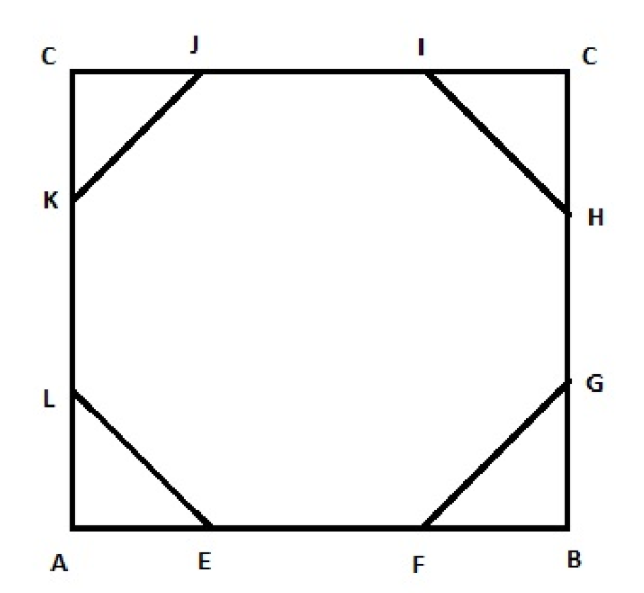Question
Question: A square whose side is \(2\) meters has its corners cut away so as to form an octagon with all sides...
A square whose side is 2 meters has its corners cut away so as to form an octagon with all sides equal. Then, the length of each side of the octagon in meters is:
A) 2+12
B) 2+12
C) 2−12
D) 2−12
Solution
In this solution, first, we have to assume a square ABCD of side’s 2meters and mark all the sides as shown in the diagram. Now we use Pythagoras theorem in the triangle ΔALE to find the side of the triangle. Once we get the sides, we use that value to find the side of the octagon.

Complete step-by-step answer:
Let us consider ABCD to be a square of side 2 meters. We form a regular octagon by cutting all four corners.
Let,
EF = FG = GH = HI = IJ = JK = KL = LE = x
By symmetry,
AE = AL = BG = BF = CH = CI = DJ = DK = a
Using,
Pythagoras theorem in ΔALE, we get
LE2=AL2+AE2x2=a2+a2 =2a
Take the square root on both sides.
⇒x=2a
And,
AB = AE +EF+FB
⇒2=a+x+a ⇒2=2a+x ⇒2a+x=2
Now,
Putting the value of x in the above equation, we get
⇒2a+2a=2 ⇒a(2+2)=2 ⇒a2(2+1)=2 ⇒a=2+12
Thus, the length of each side of the octagon is 2+12m.
Hence, the correct option is B.
Note: An octagon is a geometric shape having eight sides and eight angles, and a square is a regular quadrilateral, meaning it has four equal sides and four equal corners. It can also be defined as a rectangle, where the length of two adjacent sides is equal. The ABCD will be denoted as a square with vertices. We need to cut down all four corners of a square to create an octagon from a square.
